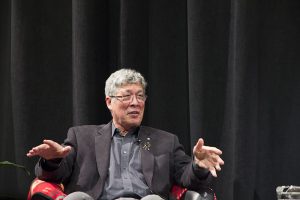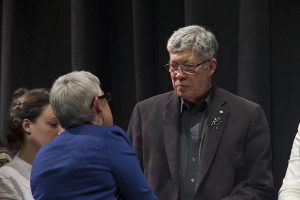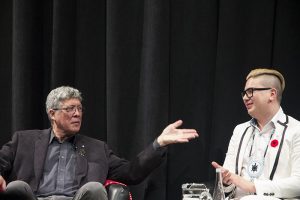
BY CHRISTY JANSSENS
The lights are turned down low. Three chairs sit waiting on the stage. One has a red blanket draped over the back.
That one is for Thomas King.
On Nov. 9, a crowd of about 250 people gathered in Macdonald-Heaslip hall to hear a conversation with author Thomas King, Sheridan’s Elijah Williams, research assistant for Sheridan’s Centre for Indigenous Learning and Support, and Alexander Hollenberg, professor of Storytelling and Narrativity.
King stressed the importance of stories. “If you tell a story enough times it becomes true,” he said. “You have to be very careful about the stories you do tell, or that you listen to.”
The complete story of indigenous people in Canada is one that is just beginning to be told. With a destructive history of colonization and the residential school system, much of the indigenous narrative is a story of cultural attack and story erasing. “When other people are setting parameters for our culture and communities,” King said, “that’s where the danger comes in.”
King is an award winning indigenous writer. His book, The Inconvenient Indian: A Curious Account of Native People in North America, is the Sheridan Reads book selection for this year. Sheridan Reads is part of the Creative Campus Series and chooses a book each year for the Sheridan community to read and discuss. King’s visit represented the official launch of the initiative this year.
“The [modern] image of native people is a creation of the entertainment industry,” King said. “It is a creation, plain and simple.” When a culture’s story is stolen, something safer must be propped up to take its place. This is the characterization of indigenous people that the media has constructed.
King said that he once took a series of photographs of indigenous people and tried to sell them to publishers. No one would take them. When he asked if the pictures would be better if the subjects wore “traditional” clothing, the publisher’s response was more positive. This response, King said, was a direct reflection of the media’s influence on what we perceive to be a true indigenous person.

“Honestly, I think that most people have not interacted with an indigenous person to know what that means,” says Paula Laing, initiatives coordinator for the Centre for Indigenous Learning and Support at Sheridan. “They have a visual picture, they have a news coverage picture, they have a movie picture, they have a story read to them in class. It’s mostly historic . . . There’s no modern picture of indigenous people.”
So how does one become more conscious about what stories they tell and what stories to believe?

“I think it’s important to just filter through all those stories,” says Williams. “It’s your responsibility to research and find out what is actually true. That’s where a lot of people make mistakes. They just believe what they hear the first time and they generalize everybody.”
“I honestly believe that Canada needs to change its overall knowledge, understanding, biases, prejudices against who and what First Nations people represent in Canada,” says Laing. “And then there’s the differences amongst our own selves, who’s legal, who’s status, who’s non-status: who’s Indian ‘enough.’ It always comes back to if you’re enough. And that comes back to valuing human life and valuing what we contributed.”
“We’re only at truth,” she says. “I don’t even know what reconciliation looks like, but it sure as hell better not look like assimilation.”
King’s simple, yet cautionary words offer another truthful guidepost:
“Watch for the stories.”
Sheridan Reads is holding a follow up event on Nov. 23 at 7 p.m. outside of the Marquee at Trafalgar Campus. This is a story sharing evening, open to the public, focused on the theme Building Community Through Story.
